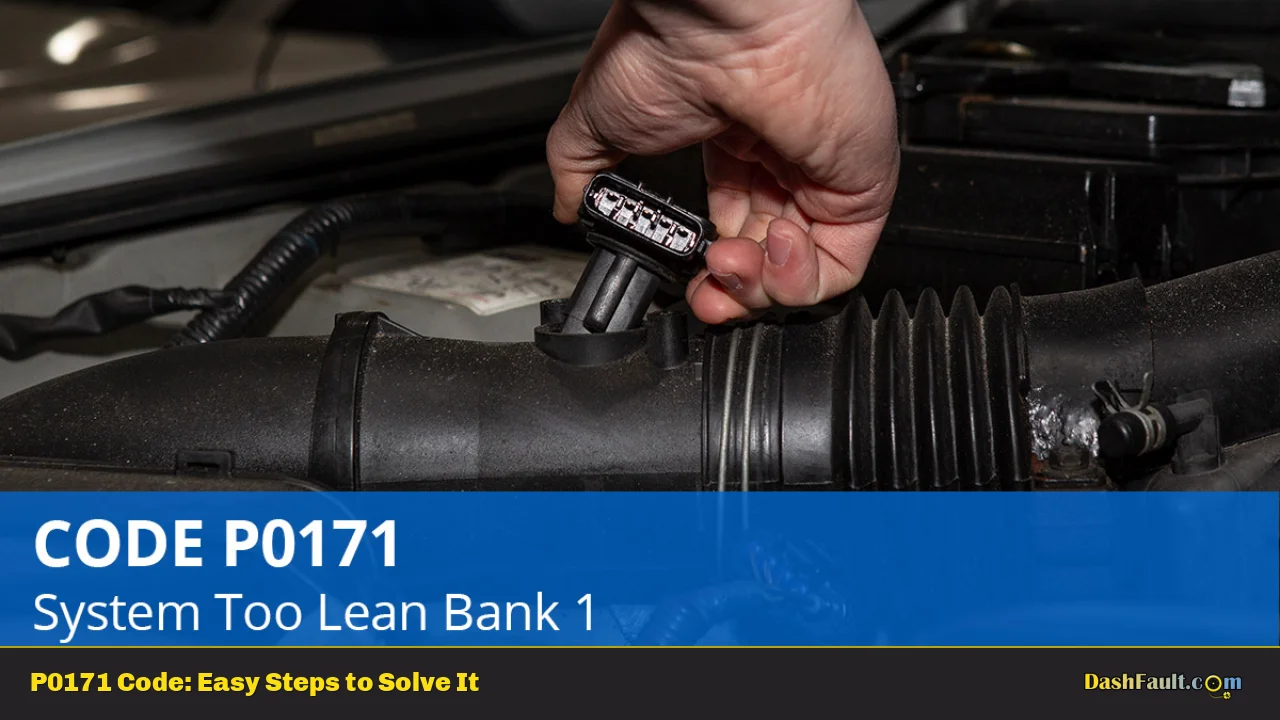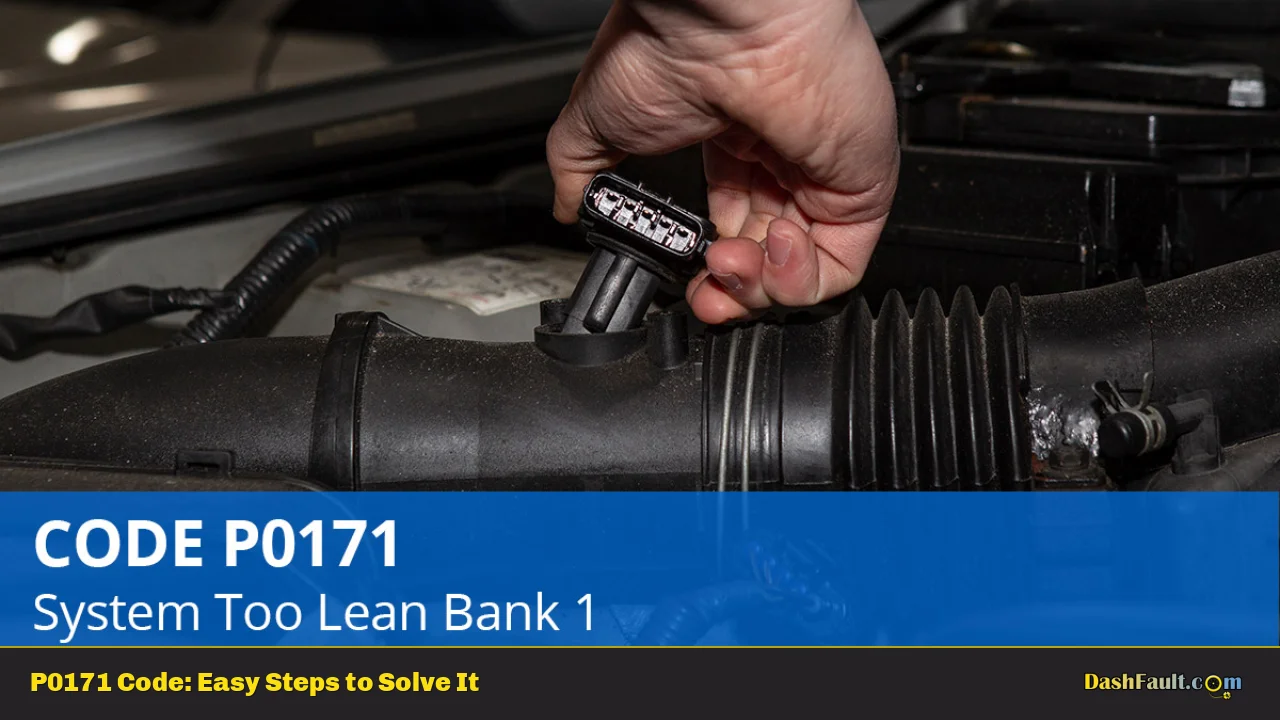The P0171 trouble code is a common diagnostic code that indicates a lean fuel condition in bank 1 of the engine. This means the engine is receiving too much air or not enough fuel in the combustion process. When the powertrain control module (PCM) detects this imbalance, it triggers the check engine light and stores the P0171 code. Understanding this code and its implications is crucial for maintaining your vehicle’s performance and preventing potential damage.
| P0171 Code Meaning | P0171 Code Common Causes |
|---|---|
| System too lean (Bank 1) | Vacuum leaks |
| Excess air in the fuel mixture | Faulty or dirty mass airflow sensor (MAF) |
| Insufficient fuel delivery | Clogged fuel injectors |
| Bank 1 oxygen sensor detecting lean condition | Weak fuel pump or low fuel pressure |
| PCM unable to maintain proper air-fuel ratio | Faulty oxygen sensors |
Vacuum Leaks: A Common Culprit
Vacuum leaks are one of the most frequent causes of the P0171 code. These leaks allow unmetered air to enter the engine, disrupting the carefully calibrated air-fuel mixture.
Symptoms:
- Rough idle
- Stalling
- Hissing sound from the engine bay
- Decreased fuel efficiency
Technical explanation:
Vacuum leaks occur when there’s a breach in the intake system after the mass airflow sensor. This allows air to bypass the sensor, causing the PCM to miscalculate the amount of fuel needed for combustion.
Step-by-step diagnosis:
- Visually inspect all vacuum lines and hoses for cracks, splits, or disconnections.
- Use a smoke machine to pressurize the intake system and reveal small leaks.
- Listen for hissing sounds with the engine running.
- Check the intake manifold gaskets for deterioration.
- Inspect the PCV valve and its connections for proper sealing.
Solution methods:
- Replace damaged vacuum lines or hoses
- Reseal or replace the intake manifold gasket
- Replace faulty PCV valve or related components
Cost estimates:
- DIY vacuum line replacement: $20-$50
- Professional intake manifold gasket replacement: $200-$600
- PCV valve replacement: $50-$150
Warning: Always ensure the engine is cool before inspecting or replacing components in the engine bay to avoid burns.
Mass Airflow Sensor Issues
A faulty or dirty mass airflow sensor (MAF) can cause inaccurate air flow readings, leading to the P0171 code.
Symptoms:
- Poor acceleration
- Engine hesitation
- Rough idle
- Increased fuel consumption
Technical explanation:
The MAF sensor measures the amount of air entering the engine. If it’s not functioning correctly, it may report lower airflow than actual, causing the PCM to inject less fuel than necessary.
Step-by-step diagnosis:
- Remove the MAF sensor from the air intake.
- Inspect for dirt, oil, or debris on the sensing element.
- Check for damage to the sensor’s wiring or connector.
- Use a multimeter to test the sensor’s resistance and voltage output.
- Scan for specific MAF-related codes (P0100-P0104).
Solution methods:
- Clean the MAF sensor with a specialized MAF cleaner spray
- Replace the air filter if clogged
- Replace the MAF sensor if cleaning doesn’t resolve the issue
Cost estimates:
- MAF sensor cleaning kit: $10-$20
- New air filter: $15-$50
- MAF sensor replacement: $150-$400
Recommendation: Always use a high-quality air filter and replace it according to the manufacturer’s schedule to protect the MAF sensor.
Fuel System Problems
Issues with the fuel system, such as clogged injectors or a weak fuel pump, can lead to insufficient fuel delivery and trigger the P0171 code.
Symptoms:
- Loss of power
- Hard starting
- Engine misfires
- Poor fuel economy
Technical explanation:
The fuel system must deliver the precise amount of fuel to match the air entering the engine. When components like injectors or the fuel pump fail to perform optimally, the air-fuel mixture becomes too lean.
Step-by-step diagnosis:
- Check fuel pressure using a fuel pressure gauge.
- Inspect fuel injectors for clogging or leaks.
- Listen for the fuel pump priming when turning the key to “ON”.
- Check fuel filter for restrictions.
- Examine fuel pressure regulator for proper operation.
Solution methods:
- Clean or replace fuel injectors
- Replace weak fuel pump
- Change clogged fuel filter
- Replace faulty fuel pressure regulator
Cost estimates:
- Fuel injector cleaning service: $50-$150
- Fuel pump replacement: $300-$1000
- Fuel filter replacement: $50-$200
- Fuel pressure regulator replacement: $150-$400
Warning: Always relieve fuel system pressure before working on fuel components to prevent injury and fire hazards.
Oxygen Sensor Malfunctions
Faulty oxygen sensors can provide incorrect feedback to the PCM, leading to improper fuel trim adjustments and the P0171 code.
Symptoms:
- Decreased fuel efficiency
- Rough idle
- Failed emissions test
- Inconsistent engine performance
Technical explanation:
Oxygen sensors monitor the exhaust gases to help the PCM maintain the correct air-fuel ratio. When they malfunction, they may incorrectly signal a lean condition, causing the PCM to add more fuel than necessary.
Step-by-step diagnosis:
- Use an OBD-II scanner to check for oxygen sensor-related codes.
- Monitor oxygen sensor voltage output using a scan tool.
- Inspect sensor wiring and connectors for damage.
- Check exhaust system for leaks near the oxygen sensors.
- Verify proper sensor heating with a multimeter.
Solution methods:
- Replace faulty oxygen sensors
- Repair damaged wiring or connectors
- Address any exhaust leaks
Cost estimates:
- Oxygen sensor replacement: $100-$300 per sensor
- Wiring repair: $50-$200
- Exhaust leak repair: $100-$500
Recommendation: Replace oxygen sensors at manufacturer-recommended intervals, typically every 60,000 to 100,000 miles.
PCM Software Updates
In some cases, the P0171 code may be triggered due to outdated PCM software that doesn’t properly compensate for normal engine wear.
Symptoms:
- Persistent check engine light with no other apparent issues
- Slight decrease in fuel efficiency
- Intermittent rough idle
Technical explanation:
As engines age, their operating characteristics change slightly. PCM software updates can adjust fuel trim parameters to account for these changes and prevent false lean condition detections.
Step-by-step diagnosis:
- Check with the vehicle manufacturer for any available PCM updates.
- Verify the current software version of your vehicle’s PCM.
- Review technical service bulletins (TSBs) related to P0171 for your specific make and model.
- Assess if the symptoms align with known issues addressed by software updates.
Solution methods:
- Perform PCM software update at a dealership or qualified service center
- If no update is available, consider having the PCM’s adaptive memory reset
Cost estimates:
- PCM software update: $50-$200
- PCM adaptive memory reset: $50-$100
Warning: Only trust authorized dealers or reputable service centers to perform PCM updates to avoid potential programming errors.
In conclusion, the P0171 code, while common, can stem from various issues ranging from simple vacuum leaks to complex fuel system problems. By following the diagnostic steps outlined for each potential cause, you can narrow down the issue and take appropriate action. Remember that while many of these repairs can be DIY projects for experienced home mechanics, some may require specialized tools or expertise. Always prioritize safety and don’t hesitate to seek professional help when needed, especially for fuel system repairs or electrical diagnostics.
Regular maintenance, such as timely air filter replacements and fuel system cleanings, can help prevent many of the issues that lead to the P0171 code. By staying proactive with your vehicle’s care, you can avoid more serious and costly repairs down the road.
Frequently Asked Questions About P0171
- Can I drive my car with a P0171 code?
While you can drive short distances, it’s not recommended for extended periods. The lean condition can cause engine damage and decreased performance. - How urgent is it to fix a P0171 code?
It’s important to address it soon to prevent potential engine damage and decreased fuel efficiency. If accompanied by drivability issues, seek immediate repair. - Will a P0171 code clear itself?
The code may clear if the issue resolves temporarily, but it will likely return if the underlying problem isn’t fixed. Proper diagnosis and repair are necessary for permanent resolution. - How much does it typically cost to fix a P0171 code?
Costs can range from $50 for a simple vacuum leak repair to over $1000 for major fuel system components. An accurate diagnosis is crucial for estimating repair costs. - Can a dirty air filter cause a P0171 code?
Yes, a severely clogged air filter can restrict airflow, potentially triggering a P0171 code. Regular air filter replacement is an easy preventive measure. - Is the P0171 code related to emissions?
Yes, a lean condition can affect emissions output. Vehicles with this code may fail emissions tests due to increased NOx production. - Can bad gas cause a P0171 code?
While rare, contaminated or low-quality fuel can contribute to lean conditions. However, it’s more likely to cause rich condition codes or misfire codes. - How long does it take to diagnose and fix a P0171 code?
Diagnosis typically takes 1-2 hours. Repair time varies widely depending on the cause, ranging from 30 minutes for simple fixes to several hours for complex issues.

